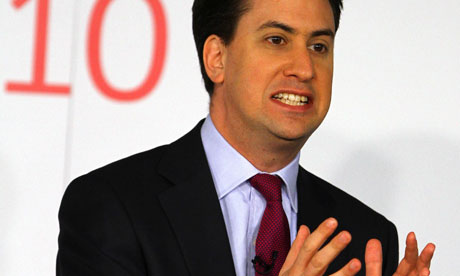
Ed Miliband is to throw open key Labour decisions to the public – including those on policy and the choice of future leaders – in an attempt to revive the party's links with the community.
In a speech to Labour's national policy forum, he declared Labour the "people's party" and said it had to become more "rooted" in the lives of the electorate if it was to regain support and respect. "A hundred years ago, when we were founded, people's allegiances were much more likely to be inherited rather than chosen," he said. "Today the world is very different. People are much more likely to choose that allegiance rather than inherit it."
Labour, stressed Miliband, could not survive as a "party of declining membership" but had to relaunch itself as a "genuine community organisation" that embraced non-members.
Miliband, who has been criticised privately by some Labour MPs for not making his mark on the leadership rapidly or firmly enough, insisted that union members would remain a vital part of decision-making. But aides said he was keen to see the public involved in future as well.
One idea could be to give non-Labour members a share of the vote in future leadership contests – a move that could anger the grassroots. One senior Labour MP said: "If members of the public are to have a say in all these things, what is the point of being a Labour member?"
The moves will be seen as Miliband hitting back at critics who say he is in the grip of the unions. Miliband tackled the issue head on, saying a system under which one person could have several votes in a leadership contest by being a party member but also a member of a trade union and another affiliated organisation had to change. He also said his focus would be the "squeezed middle".
But data released last night suggested Miliband may be going for the wrong group. Figures from the 2010 British Election Study, which is carried out by the University of Essex, showed that 35% of the working class did not vote. "Ed Miliband is focusing attention on the 'squeezed middle-class', but if Labour had appealed more to working-class voters, it could have won," said Paul Whiteley, professor of politics at Essex.
It comes as Compass – a Labour-based campaign group – voted to open its membership to people from other parties. The move will be seen as reaching out, in particular, to Liberal Democrats.
Neal Lawson, the chair of Compass, said: "To win a progressive alliance in government we first need a progressive alliance of ideas in the country."

No hay comentarios:
Publicar un comentario